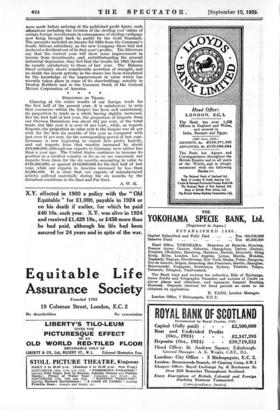FINANCIAL NOTES
NOBEL INDUSTRIES.
Tire annual report of Nobel Industries, one of the largest of the industrial post-war combines, and possessing most varied interests, provides an excellent example of the way in which a financial position can be improved by sound financial methods. Little more than two years ago the Company's capital account was burdened with £3,000,000 of 8 per cent. Notes, but thanks to the way in which resources had been husbanded, these were largely paid off from accumulated funds and the balance by means of an issue of Debentures at 5i per cent. The profits for 1923 bore the last instalment of interest payable on the notes and also the premium on their redemption, these two items coming to about £95,000. For 1924, the accounts for which year have just been issued, the only prior charge is that in respect of Debenture Interest, and the dividend on the Ordinary shares was increased by 1 per cent. to 9 per cent. The profit shown in the accounts at £1,008,402 was apparently £175,000 less than in theprevious year, but the report rather - suggests that -su • allocations for. various purposes were made before arriving at the published profit figure, such allocations including the revision of the sterling cost values of certain foreign investments in consequence of sterling exchange now being brought back to parity by the Gold Standard. The accounts included no income for 1924 from the Company's South African subsidiary, as the new Company there had not declared a dividend out of its first year's profits. The Directors say that the current year will show some improvement in income from investments, and, notwithstanding the general industrial defiression, they feel that thee-results for 1925 should be equally satisfactory to those of last year. The Balance Sheet certainly shows considerable accretion of strength, and no doubt the recent activity in the- shares has been stimulated by the knowledge of the improvement in value which has recently taken place in some of its shareholdings, notably in Dunlop Rubbers and in the Common Stock of the General Motors Corporation of America.











































 Previous page
Previous page